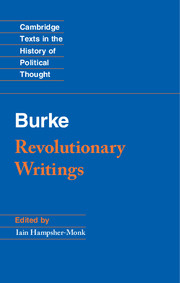 Revolutionary Writings
Revolutionary Writings Book contents
- Frontmatter
- CONTENTS
- Preface
- Acknowledgements
- Editor’s introduction
- Further reading
- Chronology
- Notes
- A note on the texts of Reflections and the Letter on a Regicide Peace
- Abbreviations
- Reflections on the Revolution in France
- Reflections on the revolution in France, and on the proceedings in certain societies in London relative to that event. In a letter intended to have been sent to a gentleman in Paris. By the Right Honourable Edmund Burke
- The first Letter on a Regicide Peace
- Appendix Variant readings
- Index
- References
Reflections on the revolution in France, and on the proceedings in certain societies in London relative to that event. In a letter intended to have been sent to a gentleman in Paris. By the Right Honourable Edmund Burke
Published online by Cambridge University Press: 05 June 2014
- Frontmatter
- CONTENTS
- Preface
- Acknowledgements
- Editor’s introduction
- Further reading
- Chronology
- Notes
- A note on the texts of Reflections and the Letter on a Regicide Peace
- Abbreviations
- Reflections on the Revolution in France
- Reflections on the revolution in France, and on the proceedings in certain societies in London relative to that event. In a letter intended to have been sent to a gentleman in Paris. By the Right Honourable Edmund Burke
- The first Letter on a Regicide Peace
- Appendix Variant readings
- Index
- References
Summary
It may not be unnecessary to inform the Reader, that the following Reflections had their origin in a correspondence between the Author and a very young gentleman at Paris, who did him the honour of desiring his opinion upon the important transactions, which then, and ever since, have so much occupied the attention of all men. An answer was written some time in the month of October, 1789; but it was kept back upon prudential considerations.That letter is alluded to in the beginning of the following sheets. It has been since forwarded to the person to whom it was addressed. The reasons for the delay in sending it were assigned in a short letter to the same gentleman. This produced on his part a new and pressing application for the Author’s sentiments.
The Author began a second and more full discussion on the subject. This he had some thoughts of publishing early in the last spring; but the matter gaining upon him, he found that what he had undertaken not only far exceeded the measure of a letter, but that its importance required rather a more detailed consideration than at that time he had any leisure to bestow upon it. However, having thrown down his first thoughts in the form of a letter, and indeed when he sat down to write, having intended it for a private letter, he found it difficult to change the form of address, when his sentiments had grown into a greater extent, and had received another direction. A different plan, he is sensible, might be more favourable to a commodious division and distribution of his matter.
- Type
- Chapter
- Information
- Revolutionary WritingsReflections on the Revolution in France and the First Letter on a Regicide Peace, pp. 3 - 250Publisher: Cambridge University PressPrint publication year: 2014
References
- 4
- Cited by


